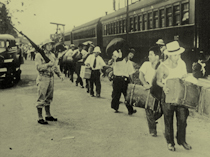

Panama Canal Zone: Japanese Peruvians en route to U.S. Internment Camps. April 2, 1942. U.S. Army Signal Corps Photo. National Archives. Courtesy of National Japanese American Historical Society.
| Join Our Mailing List |
Campaign for Justice
P.O. Box 1384
El Cerrito, CA 94530
(510) 528-7288
info@campaignforjusticejla.org
|
WHAT WE DO For background information, please see the History section. Skip the following paragraph and go directly to: Litigation, Legislation, Educational outreach THE STRUGGLE CONTINUES The struggle of former Japanese Latin American (JLA) internees for acknowledgment and justice began in the early 1980's during the early stages of the Japanese American (JA) Redress movement. Because the Civil Liberties Act of 1988 was not interpreted to include JLAs, we were denied proper redress. Thus, our fight continues today through litigation, legislation, educational outreach and grassroots organizing. We urge our communities to support these efforts to acknowledge and redress the fundamental injustices suffered by JLAs during WWII. We cannot allow this chapter of US history to close until the US government makes proper amends for wrongdoing that is at the level of severity of war crimes and crimes against humanity. The wartime treatment of JLAs was part of a larger "enemy alien" program which also targeted people of German and Italian descent in the US and from Latin America. Over 31,000 of these enemy aliens were apprehended, thousands were put into internment camps, and over 4800 (including US citizens who were the minor children of resident aliens) were forcibly deported in civilian prisoner exchanges. There are an estimated 1200 JAs and JLAs who have not yet received an apology nor proper redress for the wartime violations of their rights. There are also thousands of persons of German and Italian ancestry who have not yet been given proper acknowledgment let alone apology. Moreover, the educational mandate of the Civil Liberties Act of 1988 has not been fulfilled with 90% of the education funds (totaling $45 million) still owed to the American public. What has been gained by the Japanese American redress movement, especially passage of the Civil Liberties Act of 1988? What has been learned from the US government's continued opposition to the JAs and JLAs who have not yet received proper redress? After the tragedies of 9/11, the targeting and detention of Arabs, Muslims and South Asians reminds us that we must act if the phrase, "Never again," is to have any meaning, especially since history is being repeated against a "new" enemy. Sixty years after the war, the US government is still fighting Japanese Americans (JAs) and Japanese Latin Americans (JLAs) in court. The US government has yet to fully acknowledge the civil and human rights violations committed against people of Japanese ancestry during WWII, including war crimes perpetrated against the JLAs. Between 1996 and 1999, five lawsuits were filed on behalf of the former JLA internees. The Mochizuki, et al. v. USA case resulted in a settlement whereby the US government agreed to issue individual apology letters and compensation of $5,000 per internee. While the settlement agreement terminated further litigation, there was a provision that specifically provided for the pursuit of legislation for equitable relief in the US Congress. The other four lawsuits were dismissed by the US courts. For the JLA internees who rejected the Mochizuki settlement and were unable to secure justice in the US courts, they continue the struggle in the international arena. In June 2003, a petition on behalf of the JLAs was filed with the Inter-American Commission on Human Rights (a body of the Organization of American States) to hold the US government accountable for the ongoing failure to provide redress for war crimes and crimes against humanity. Let’s urge the US government to stop the costly and lengthy litigation and to support a proper apology and redress for JLAs. Read More In 2007, U.S. Representative Xavier Becerra (D-CA), along with Representative Daniel Lungren (R-CA), and Representative Mike Honda (D-CA) in the House, and U.S. Senator Daniel Inouye in the Senate, re-introduced the “Commission on Wartime Relocation and Internment of Latin Americans of Japanese Descent Act” (S. 381 and H.R. 662). This commission bill will establish a federal commission to study the wartime violations committed by the U.S. government against Japanese Latin Americans during World War II, and make recommendations for any appropriate remedies based on their findings. The commission would be composed of 9 members: 3 each appointed by the President, Speaker of the House of Representatives, and the President pro tempore of the Senate. Read more about the Commission Bill. WRITE YOUR REPRESENTATIVES TODAY! Click Here to send a letter to your Representatives
|
HOME | WHO WE ARE | WHAT WE DO | GET INVOLVED
RESOURCES | HISTORY | MEDIA ROOM | LINKS
Contact: Campaign for Justice